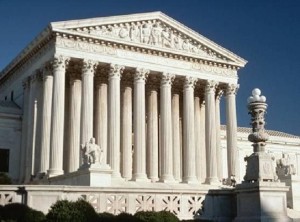WASHINGTON (Reuters) – The U.S. Supreme Court on Tuesday (1/13/15) ruled in favor of homeowners seeking to back out of mortgages when lenders are accused of failing to follow the federal “truth in lending” law.
On a 9-0 vote, the court handed a win to an Eagan, Minnesota couple, Larry and Cheryle Jesinoski, over the $611,000 loan they obtained in 2007 from Countrywide Home Loans Inc, now part of Bank of America Corp.
On the technical question before the justices, the court said homeowners need only write a letter to the lender, as the Jesinoskis did, and do not need to file a lawsuit in order to benefit from a provision of a federal law known as the Truth in Lending Act.
The law allows consumers to rescind a mortgage for up to three years after it was made if the lender does not notify them of various details about the loan including finance charges and interest rates. The Jesinoskis filed their notice right before the end of the three-year period and filed a lawsuit a year later after the bank said it was disputing the claim.
The language of the law “leaves no doubt that rescission is effected when the borrower notifies the creditor of his intention to rescind,” Justice Antonin Scalia wrote on behalf of the court.
The provision is typically used by homeowners who are struggling to pay their mortgages. Lawyers for consumers say mortgage companies routinely violated the law in the years prior to the 2008 financial crisis. Lenders contend that notice is not enough if the bank in question disputes the homeowners’ claim.
Appeals courts had been split over what homeowners have to do to trigger this rescission process. The Jesinoskis appealed a lower-court decision that favored Countrywide. The Supreme Court reversed that lower-court ruling.
The case is Jesinoski v. Countrywide, U.S. Supreme Court, No. 13-684
Note: Those who sell property via installment sale notes (“seller financing”) are generally exempt from the Truth in Lending law disclosure requirements.



The tag line at the end of this article may be misleading. If “installment sales note” means unsecured by the property through a Deed of Trust, then there may be exemptions. If this means a typical real estate lien note with a Deed of Trust, there are some exemptions from licensing, but not exemptions from RESPA, TILA and other State and National disclosures to the buyer/borrower.
So what does that mean for those of us who are buying loans in the secondary market?
Does rescinding mean that the borrower can cancel the agreement AND has to repay the outstanding balance ? + interest ?
So what is the bottom line when it is all said and done? Do the borrowers get a $611,000 loan for free because they “rescinded” within the 3 yr. time frame or do they have to pay the $611,000 back? It looks like they were angling for a “free” $611,000 or if not, why not pay back the mortgage money and not go to court in the 1st place?
It means that all payments made to the bank,including all interest,fees and closing costs,appraisals,and any other cost associated with the loan and origination are reimbursed towards the principal.then the statutory violations by the bank for denying rescission are calculated and deducted from the principal. then any civil violations are calculated and deducted . then the borrower must tend the balance. However,it is not always equitable for the borrower to tender immediately,and often the bank must finance tender at very low interest rates for long periods of time.Serves them right . The bank did not care two cents if the people were thrown out on the street in the middle of January. When rescission is finally completed,the bank must pay all fair attorney fees to the homeowner,to be distributed to their attornies.
The only reason there was a split in the circuits,is because the bank attorneys bastardized the language of TILA. they brought this on themselves
I have to believe the finance charges and interest rates WERE in the documents that were signed by the buyer. Does anyone have more info, as this article really does not go into the REAL FACTS behind this decision and how it could have been brought.